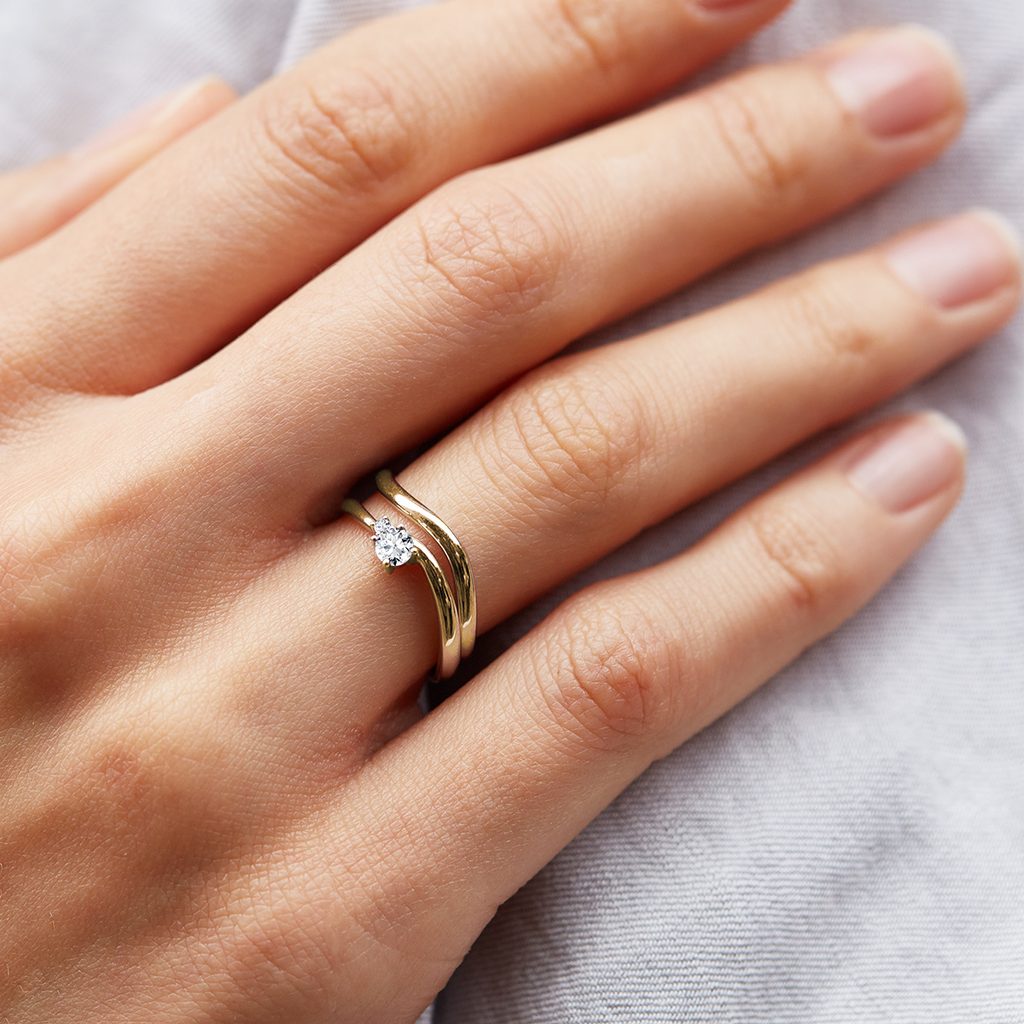
What are Ethical Engagement Rings?
An engagement ring is more than just a piece of jewelry; it’s a symbol of love, commitment, and the promise of a future together. But for many, it’s also important that the ring reflects their values. Ethical engagement rings are designed and sourced with consideration for environmental sustainability, social responsibility, and ethical labor practices. Choosing an ethical engagement rings means that the beauty of your symbol of love is backed by a commitment to making the world a better place.
Defining Ethical Jewelry
Ethical jewelry focuses on producing pieces that are created in a way that minimizes harm to the environment, supports fair labor practices, and avoids any associations with conflict or exploitation. In the case of engagement rings, ethical considerations typically involve ensuring that the materials used, such as diamonds, metals, and gemstones, are sourced responsibly. This can include using lab-grown diamonds, recycled metals, and fair-trade gemstones.
The Importance of Ethical Engagement Rings
The growing demand for ethical engagement rings reflects a shift in consumer consciousness. With more couples seeking to align their personal values with their purchasing decisions, ethical rings offer a meaningful way to celebrate love while also contributing to the greater good. Whether it’s protecting the environment, supporting fair wages for workers, or ensuring conflict-free sourcing, an ethical engagement ring allows couples to feel proud of their purchase in every sense.
Why Choose an Ethical Engagement Ring?
Choosing an ethical engagement ring isn’t just about wearing something beautiful—it’s about making a conscious choice to support sustainability, fairness, and ethical practices. Here’s why more couples are opting for ethical rings.
Environmental Impact
One of the most significant reasons to choose an ethical engagement ring is its reduced environmental footprint. Traditional mining, especially for diamonds, gold, and other precious materials, often involves destructive processes like deforestation and soil erosion. By choosing an ethical engagement ring, you’re contributing to a cleaner, greener planet by supporting the use of recycled materials or lab-grown diamonds, both of which significantly reduce environmental damage.
Fair Labor Practices
Ethical rings are also about ensuring that workers involved in the production process are treated fairly and paid decent wages. In the traditional jewelry industry, especially in some mining sectors, labor conditions can be exploitative, with workers facing unsafe conditions and low pay. Ethical jewelers, however, work with suppliers who adhere to fair labor practices, ensuring that artisans and workers are treated with dignity and respect.
Conflict-Free Diamonds
Another key consideration when choosing an ethical engagement ring is ensuring that your diamond or gemstone is conflict-free. The term “blood diamonds” refers to diamonds that are mined in war zones and sold to finance armed conflict. Ethical engagement rings often feature conflict-free diamonds that are certified as coming from sources that don’t fund violence or human rights abuses.
Types of Ethical Engagement Rings
When shopping for an ethical engagement ring, you’ll come across several types of ethical materials and designs. Here’s an overview of the most common options.
Lab-Grown Diamonds
Lab-grown diamonds are real diamonds that are created in a laboratory using high-tech methods that replicate the conditions under which natural diamonds form. These diamonds are chemically, physically, and optically identical to mined diamonds but without the environmental and ethical concerns associated with mining. Lab-grown diamonds are becoming increasingly popular as an ethical choice for engagement rings due to their affordability and sustainable nature.
Recycled and Sustainable Materials
Many ethical jewelers focus on using recycled metals and materials for their engagement rings. This helps reduce the need for new mining, which can be destructive to the environment. Using recycled gold, silver, or platinum minimizes waste and reduces the environmental impact of creating new jewelry.
Recycled Gold and Silver
Recycled gold and silver come from previously used jewelry, electronics, or other sources. By melting down and refining old pieces, jewelers can create new rings without the need for new mining operations. This process helps reduce the carbon footprint associated with mining and ensures that precious metals are reused rather than wasted.
Recycled Diamonds
Some jewelers also use recycled diamonds, which are sourced from old or broken jewelry. These lab diamonds are cleaned, cut, and set into new designs, giving them a second life while reducing the need for new diamond mining.
Fair-Trade Diamonds
Fair-trade diamonds are sourced from mines that meet high ethical standards, including ensuring that workers are paid fair wages and that mining practices don’t harm the environment. These diamonds are certified by organizations like the Fairtrade Foundation, ensuring that the diamonds are produced under transparent, responsible, and ethical conditions.
Alternative Gemstones
While diamonds are the most common choice for engagement rings, there are other beautiful and ethical options to consider. Alternative gemstones, such as sapphires, emeralds, and rubies, can be a more sustainable choice. Many of these gemstones are available from ethically mined sources or can be lab-grown.
How Ethical Engagement Rings Are Made
Creating an ethical engagement ring involves a combination of sustainable sourcing and responsible craftsmanship. The process can vary depending on the type of materials used, but here are the general steps involved.
The Process of Creating Lab-Grown Diamonds
Lab-grown diamonds are created using two primary methods: High Pressure High Temperature (HPHT) and Chemical Vapor Deposition (CVD). Both methods replicate the natural conditions in which diamonds form deep within the Earth. The resulting diamonds are real diamonds that have the same physical and chemical properties as those mined from the Earth, but with a much smaller environmental footprint.
Sourcing Ethical Materials
Ethical engagement rings begin with responsible sourcing of materials. Whether it’s sourcing conflict-free diamonds, recycled gold, or fair-trade gemstones, ethical jewelers work with suppliers who adhere to strict ethical guidelines. This ensures that every component of the ring is sourced with care and responsibility.
Certifications and Standards for Ethical Engagement Rings
Certifications and standards are essential when choosing an ethical engagement ring. These provide assurance that the materials used in your ring are sourced responsibly and ethically.
Certified Conflict-Free Diamonds
The most common certification for conflict-free diamonds is the Kimberley Process, which aims to prevent the trade of blood diamonds. Other certifications, like the Responsible Jewelry Council (RJC) and the International Colored Gemstone Association (ICA), ensure that diamonds are sourced from ethical and responsible sources.
Fairmined and Fairtrade Certification
Fairmined and Fairtrade certifications are awarded to gold and other precious metals that meet high standards for environmental sustainability and fair labor practices. When shopping for an ethical engagement ring, look for these certifications to ensure that the metal has been sourced responsibly.
The Kimberley Process
The Kimberley Process is an international certification system that aims to prevent the trade of conflict diamonds. While it has its limitations, it remains an essential tool in ensuring that diamonds are sourced without contributing to human rights abuses or funding violence.
Benefits of Choosing an Ethical Engagement Ring
Choosing an ethical engagement ring offers a variety of benefits beyond the peace of mind that comes with knowing your ring is sourced responsibly.
Peace of Mind
By choosing an ethical engagement ring, you can rest easy knowing that your ring was made with care for both the planet and the people involved in its creation. You can feel proud that your love story is backed by a commitment to sustainability, fairness, and social responsibility.
Long-Term Value
Ethical engagement rings often hold their value well over time, particularly if they’re made with high-quality materials like lab-grown diamonds or recycled metals. Choosing an ethical ring also means supporting brands that prioritize transparency and ethical business practices.
Supporting Responsible Practices
Choosing an ethical engagement ring is a powerful way to support companies and brands that are committed to responsible business practices. Whether it’s through fair wages for workers, eco-friendly sourcing, or conflict-free diamonds, your purchase can have a positive impact on the world.
How to Choose the Right Ethical Engagement Ring for You
Choosing an ethical engagement ring involves considering your personal values, style preferences, and budget. Here are some steps to guide you.
Consider Your Values and Priorities
Think about what matters most to you when it comes to your engagement ring. Is it the environmental impact? The treatment of workers? The transparency of the sourcing process? Defining your priorities will help you choose the best ethical ring for your values.
Budgeting for an Ethical Ring
While ethical engagement rings can be more expensive than traditional rings, they often provide great value for their quality and sustainability. Be sure to set a realistic budget and explore the different options available, including lab-grown diamonds, recycled metals, and fair-trade gemstones.
Design and Customization Options
Ethical engagement rings come in a wide variety of designs and styles. Whether you prefer a classic solitaire, a vintage-inspired design, or something more modern and unique, you can find an ethical ring that suits your style and personality.
Challenges in the Ethical Jewelry Industry
Despite its many benefits, the ethical jewelry industry does face some challenges.
Cost Considerations
Ethical engagement rings can sometimes be more expensive than traditional rings, particularly if they feature high-quality materials like lab-grown diamonds or fair-trade gemstones. However, the added cost is often justified by the ethical and environmental benefits.
Finding Authentic Ethical Sources
Finding truly ethical sources for diamonds, metals, and gemstones can sometimes be tricky. It’s important to do your research and look for brands that are transparent about their sourcing and manufacturing processes.
Popular Ethical Engagement Ring Brands
Several jewelers specialize in ethical engagement rings, offering a wide range of designs and options.
Brilliant Earth
Brilliant Earth is a well-known brand that specializes in ethically sourced diamonds and fine jewelry. They offer lab-grown diamonds, recycled metals, and fair-trade gemstones, making it easy to find an ethical engagement ring that suits your needs.
Blue Nile
Blue Nile is another reputable retailer that offers a range of ethical engagement rings, including conflict-free diamonds and recycled metals. Their commitment to transparency and ethical sourcing makes them a popular choice for couples looking for an ethical engagement ring.
Vrai
Vrai offers a beautiful selection of lab-grown diamond engagement rings, focusing on sustainability and ethical practices. They are known for their commitment to creating high-quality rings that are both eco-friendly and affordable.
Conclusion
Choosing an ethical engagement ring is a beautiful way to symbolize your love while making a positive impact on the world. Whether you opt for a lab-grown diamond, recycled materials, or fair-trade gemstones, an ethical ring represents a commitment not only to your partner but also to the planet and its people. With so many options available, finding the perfect ethical engagement ring is easier than ever, and the benefits far outweigh the cost. By making this meaningful choice, you can start your journey together knowing that your love story is built on values that truly matter.










